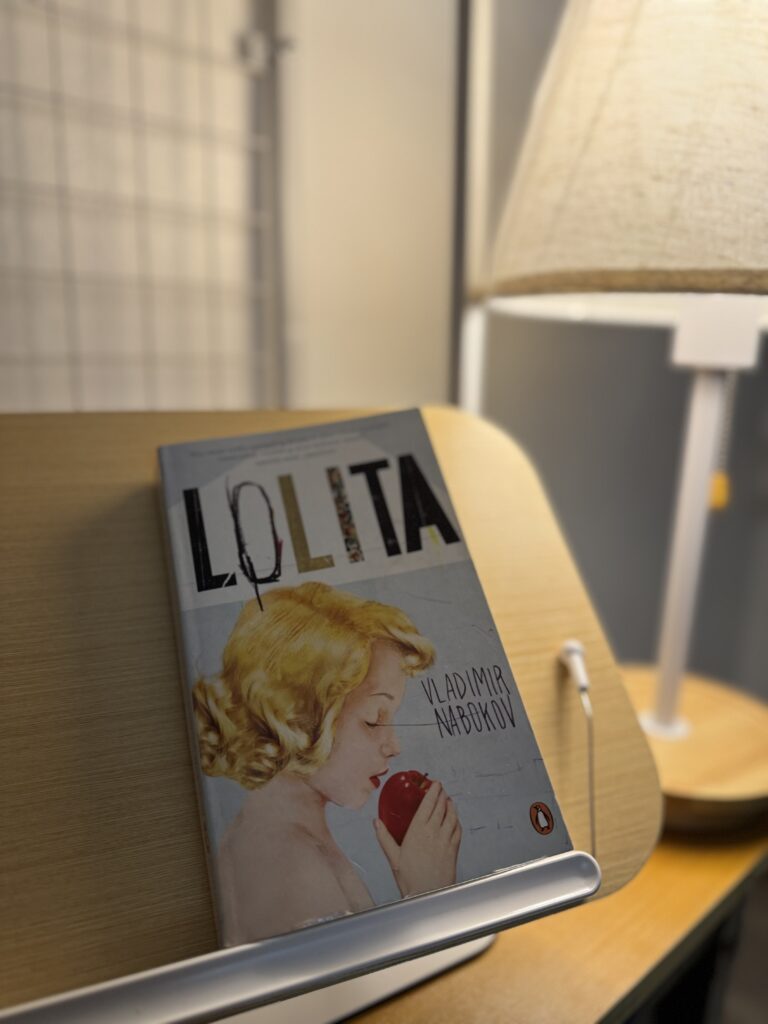
I had reservations on picking up this book. First, I was afraid it might make my morals corrupt by sympathizing with a pedophile character. Second, it might push weird ideas in my head which I cannot undo. While these reservations turned out to not be entirely true, the novel proved to be more complex and thought-provoking than I originally thought.
Lolita is a novel about a man named Humbert and a 12-year-old girl named Dolores Haze (aka Lolita). It is written from Humbert’s perspective and could have been named as Confession of a White Widowed Male as written in the foreword.
The novel provides an exploration of how Humbert manipulates Lolita into a disturbing relationship dynamic. Contrary to my first impression, this is not a story similar to a serial-killer killing victims undetected and moving on to another victim. Instead, this is a story of how a man’s obsession with a minor consumes and changes him. This obsession is inherently unsustainable because eventually the victim grows up.
By reading the novel, you’d get an answer to the ff. questions: How does this kind of relationship start? How long will this relationship continue? What will happen to this relationship when the minor gets older? How do these two relate to other people? What will be their fate?
Even though the story takes us to unexpected twists and turns, it can still pass as a likely or believable story. Also, Nabokov’s prose and poetry makes up for a deeply engrossing reading experience. Nabokov’s writing does a great job of bringing the reader into the characters’ world. You can read my highlights below to get a glimpse of the language in the novel. Because of these, I now understand why people call this Nabokov’s masterpiece.
While this novel is about abuse and trauma, Nabokov’s dark humor still managed to make me laugh several times: Humbert referring to his thing as “the scepter of my passion” (p. 14 pt. 1 ch. 5), the headmistress mispronouncing Humbert’s name several times (p. 201 pt. 2 ch. 4), buying a bunch of bananas for his monkey (p. 242 pt. 2 ch. 16), teasing the reader with his gun (p. 320 pt. 2 ch. 29 ), referring to himself as a “pentapod monster” (p. 324, pt. 2, ch. 32), and many more.
The novel also provides deep insights in human relationships, especially at the end. It made me contemplate my relationship with my family and friends and my experience in early childhood. For example, how much do parents actually try to understand the minds of their children? It’s easy for parents to dismiss their child’s thoughts and emotions and to look at them as someone to correct or advise. But those won’t really make them feel loved.
Overall, would I recommend this novel to everyone? Perhaps not. This novel is not recommended for people looking only for erotica or people wanting to find a moral lesson. As the author puts it, this novel was intended for “aesthetic bliss”, a “constant comforting presence” that provides a unexpected companionable feeling in your library despite its disturbing themes.
My Favorite Highlights
Nowadays you have to be a scientist if you want to be a killer.
p. 98 Pt. 1 Ch. 20
When you decide – when you decide all kinds of matters, I may be in complete, or in partial, let us say, disagreement – but I say nothing. I ignore the particular. I cannot ignore the general. I love being bossed by you, but every game has its rules. I am not cross. I am not cross at all. Don’t do that. But I am one half of this household, and have a small but distinct voice.
p. 102 Pt. 1 Ch. 21
The Park was as black as the sins it concealed – but soon after falling under the smooth spell of a nicely graded curve, the travelers became aware of a diamond glow through the mist, then a gleam of lakewater appeared – and there it was, marvelously and inexorably, under spectral trees, at the top of a graveled drive – the pale palace of The Enchanted Hunters.
p. 132 Pt. 1 Ch. 27
We live not only in a world of thoughts, but also in a world of things. Words without experience are meaningless.
p. 201 Pt. 2 Ch. 4
A change of environment is the traditional fallacy upon which doomed loves, and lungs, rely.
p. 272 Pt. 2 Ch. 22
You know, what’s so dreadful about dying is that you are completely on your own.
p. 324 Pt. 2 Ch. 32
It had become gradually clear … that even the most miserable of family lives was better than than parody of incest…
p. 327 Pt. 2 Ch. 32
It was high time I destroyed him, but he must understand why he was being destroyed.
p. 339 Pt. 2 Ch. 35
It is strange that the tactile sense, which is so infinitely less precious to men than sight, becomes at critical moments our main, if not only, handle to reality.
p. 349 Pt. 2 Ch. 36
It is childish to study a work of fiction in order to gain information about a country or about a social class or about the author.
Vladimir Nabokov on a Book Entitled Lolita
Pingback: Reading Literature Like a Pro - Icon's Notes